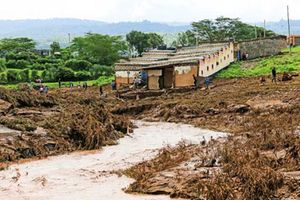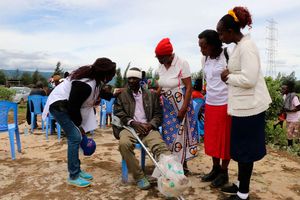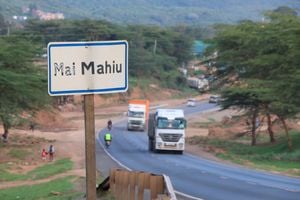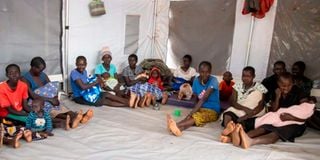
Mothers and children under the age of two in the Moinoin Internally Displaced Persons camp, Baringo North on May 2, 2024.
The cold is more than just the weather for thousands of displaced families this festive season. This is the bitter reality of displacement.
While most of those without shelter were displaced when floods hit the country early this year, some see it as a historical injustice. These include families displaced when Lake Baringo waters inundated their villages in 2020.
In Nairobi, the Sunday Nation team talked to those displaced by raging waters and fires in informal settlements while many families were affected by a landslide in Kaptembwa, Nakuru County.

Internally displaced people at Muinonin camp in Baringo South on April 25, 2024.
For many households in Tana River, Bungoma, Turkana, Baringo, Nakuru, Kisumu, Nairobi and Garissa counties, Christmas is no longer a time of celebration, but a reminder of how little they have been left with as they struggle to survive in makeshift shelters.
At least 400 families affected by fires in Mukuru, Nairobi are staring at Christmas in the cold.
Mrs Winfred Mutuku, a 35-year-old hawker who lost her one-year-old daughter in an inferno, says getting food for her other children has become a nightmare. The cold the family has to bear adds to Ms Mutuku’s pain.
“My family will not enjoy Christmas and New Year as has been the case in yesteryears. Apart from my daughter, the fire destroyed all our belongings. I am also scratching my head as we approach the new school year. I need to look for whatever my children and siblings need,” she said.
Ms Irene Ndinda, also affected by the fires, cannot travel to her rural home in Mitaboni, Machakos County. To Ms Ndinda, a sumptuous Christmas is out of question.
“I stopped thinking about meat, chapati and other expensive foods for Christmas. It is now a case of living one day at a time. I only worry about my children’s school fees,” she said.
It is the same story for residents of Kaptembwa slum in Nakuru.
Over 1,500 families, scarred by the devastation of floods earlier in the year, are still attempting to put their lives together following a landslide that destroyed whatever had remained of their houses.
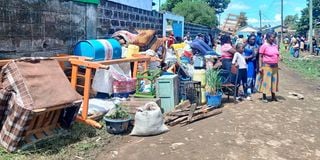
Displaced families in Kaptebwa in Nakuru whose houses were destroyed by floods in May 2024.
Floodwaters swept away many houses and residents’ belongings valued at millions of shillings. Most of these families are left with nothing but painful memories and an uncertain future. There is little to celebrate and even less to hold onto as Christmas approaches.
Ms Florence Amunga, a flood victim, told the Sunday Nation that her life has never been the same since the landslide destroyed her mud house in April.
“My three grandchildren are in school. I'm scared and anxious because our new landlord is demanding rent arrears. We could be evicted any time,” she said.
“When I see families making early preparations for Christmas or even travelling to their rural homes, I do not know what to tell my grandchildren. It is a hand-to-mouth life. One cannot get money for new clothes and other shopping by hawking vegetables in this slum.”
Landslide
Mr Joshua King’ori was a landlord and is also crying.
The landslide hit his retirement investment, forcing him to rent a house in the neighbourhood.
“I bought this piece of land and constructed some 10 rental houses which I knew would be my pension after I retired from the defunct Municipal Council of Nakuru. This is the saddest Christmas for me. I had planned to host a big family gathering on December 25 to celebrate my 75th birthday with my children and grandchildren. Still, that one will not be possible as I’m living in a small one-bedroom house with no space for such celebrations,” said Mr King’ori.
Leah Chebet was also impacted. She was forced to flee after raging waters flooded her home and damaged her household items.
“I was forced to leave a house I was paying a monthly rent of Sh1,500. I’m now renting another house at Sh2,500 and it is not easy for me as I’m a single mother of four and my mitumba (second-hand) clothes business is not doing well,” said Ms Chebet.
In Samburu, this Christmas season has brought little joy for hundreds of displaced families in Nkabaai, who have been uprooted from their homes by relentless banditry in parts of Samburu West. The festive season is marked by family gatherings and celebrations.
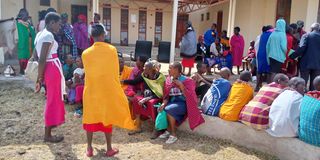
Displaced families assemble at Loiborngare centre in Samburu West following Interior Cabinet Secretary Prof Kithure Kindiki's Sunday order for all law abiding citizens in areas declared banditry crime scenes to vacate by Monday March 13, 2023.
However, in the once-bustling villages of Pura, Lkeek Sapuki and Malaso, silence reigns as locals fled their homes to escape incessant cattle raids.
They are now living in temporary structures in Nkabaai under harsh conditions with food, water and basic necessities in short supply.
“We lost almost everything to bandits from the neighbouring county. This Christmas is unusual for us, but we thank God we are alive,” says Mary Lenkaak, a mother of four.
Makeshift camps in Nkabaai offer little comfort as families are crammed into unhygienic shelters, facing a bleak holiday season with no clear end to their ordeal.
In Nyandarua, Peter Murerwa Mminyori, 80, passed away quietly in his sleep last Saturday night in Muthiga, Ndaragua Constituency, leaving behind an unfulfilled desire to reunite with his family.
Displaced during the 2007 post-election violence, Murerwa spent his final years yearning for a reunion with his four children, from whom he was separated during the chaos.
Murerwa’s ordeal began during the PEV when attackers descended on his home in Molo, Nakuru county.
In the chaos, he witnessed his wife’s brutal murder and was forced to flee for his life, leaving behind his children, two daughters, and two sons.
After fleeing Molo, Murerwa worked as a herdsman in Nyandarua before his health deteriorated, leaving him jobless and homeless.
By 2020, he had moved to a makeshift shanty on private land in Muthiga relying on the goodwill of locals for food and shelter.
“No one wanted to employ an old, sick man. I had nowhere to go, so I stayed here,” he said.
In Bungoma county, over 375 families in Mt Elgon’s Kopsiro sub-county, evicted from a public forest, face a bleak Christmas in a cave.
Some are still trapped in makeshift structures while others are either integrated in the community or resigned to fate and there is little for them to celebrate as the rest of Kenyans party during Christmas and New Year.
Mt Elgon
“There is nothing for us to celebrate about when our people are leading a life of hand to mouth yet nobody has come to their rescue,” said Robin Kipyego, Secretary, Chebue Cave Squatters.
Apart from the Sabaot who form the majority of people occupying Mt Elgon, other inhabitants of the mountainous region include the Ndorobo-Mosopisyeek, the Bok, Someek and Koony, all members of the larger Kalenjin community.
“The government needs to resolve this issue by allocating land to genuine squatters. There should be fairness in land allocation,” said Mr Kipyego.
In Turkana County about 1,500 families displaced after Lake Turkana broke its banks have nothing to celebrate this festive season.
“The families have been displaced by the swollen lake and have been integrated into the society still require support,” said Oscar Okumu, Head of Kenya Red Cross Society, North Rift region.
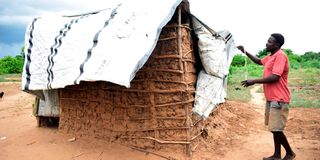
Tatizo Katana Kaingu secures the roof of his hut with a tent in Mzizimani village in Dagamra area of Kilifi County on December 19, 2024.
He said some of the families suffered mental health as a result of the disaster and are in urgent need of psychiatric counselling to recover from the effects the natural catastrophe caused.
“The displaced families require post-disaster counselling on mental health and emergency medical services to prevent outbreaks of infectious diseases,” added Mr Okumu.
In Nyanza, recent floods have left many displaced and facing hardship. Over 67 families who once enjoyed festive cheer now struggle in crowded shelters, uncertain of their future.
Pesila Adhiambo Ong’ayo, 57, has endured a painful year, from losing her daughter and enduring floods that destroyed her home twice to seeking refuge in a community shelter and ending up in a small shack.
Rose Saidi, 61, a widow, faces another year of struggling to survive instead of celebrating. Her home, weakened by repeated floods, is on the verge of collapse, and she remains at the rescue centre, resigned to spending Christmas without anything to celebrate.
“The year has been rough, from the death of my daughter to being forced to leave my home because of floods, it’s been one heartbreak after another. My house is uninhabitable, so I can’t go back until the waters fully recede. It’s a painful fact, but what can you do when you have no source of income to rely on,” she says.
In Baringo, the never-ending problem of rising lakes and the displacement that follows still torment villagers here.
In May 2020, 58-year-old Josphat Tiren was among thousands displaced by rising water levels in Lake Baringo.
Tiren, who lived in Leswa village near the lake, saw over 1,000 homes submerged as water levels drastically increased. His home, 10 goats, and five acres of maize were all marooned.
Left with no choice, Tiren and his family moved to safer grounds upstream and settled with other displaced families at Uwanja Ndege, on the outskirts of Marigat town.
Close to four years later, they remain stuck here.
“I have pitched camp with my six children in a temporary tent in Uwanja Ndege village since May 2020 as I contemplate my next move, though I have nowhere to go. I was a farmer practising irrigated agriculture at the time, but after the displacement, I have been forced to rely on menial jobs, including charcoal burning to feed my family,” said Mr Tiren.
Cecilia Sunguna is also facing the same challenge, displaced by the rising water levels in Ng’ambo village, which also saw hundreds of structures in the locality, including Ng’ambo Primary School and Ng’ambo Girls High School marooned in water.
“I have no hope of returning to the village. Some homes are out of water but who knows of tomorrow. We have learnt through experience in the past that we used to relocate to other safer villages during flooding, then go back home after the water levels reduced, only for the same to occur during rainy seasons. This time, I will not take chances,” said Ms Sunguna.
The Nation learnt that mostly women and children from Kagir, Kosile, Ng’aratuko, Chepkewel, and Kapsebeiwa who went back to their villages have been forced to put up in the same tents they lived in while squatting in safer areas.

Kahindi Kahonzi sits outside her semi-permanent house in Mzizimani village, where she moved after being displaced by flooding from the Sabaki River in May 2024.
Priscah Joseph sits in a small shanty tent, holding her three-month-old baby.
The tent is too cramped for her and her infant, let alone her other six children. She feeds her baby porridge as her breasts no longer produce enough milk.
Priscah returned to Kagir village in June after the State assured residents that calm had returned following bandit attacks. However, most homes, including hers, were vandalised by criminals. She lost everything, including over 100 goats, and struggles to feed her children, relying on rice given by the Kenya Red Cross.
“I came back to Kagir village, with a few other villagers in June after the State assured us that normalcy had returned in the banditry-prone area. We were ferried with our children using police trucks. My breasts no longer produce enough milk because of lack of food, forcing me to feed my baby with porridge at least for survival. I sleep in this shanty with my seven children, despite the rains. We have been forced to brave the colds because we have no other choice. I appeal to the State to at least build us some houses because we don’t have money to buy food, let alone building materials after all our entire livelihood was wiped by the attackers,” she said.
In Kilifi, floods that left at least 20,000 families displaced have kept them in camps ever since.
The waters affected Malindi and Magarini sub-counties, destroying homes, crops, and property, forcing many to seek refuge in schools. Some displaced families have been taken in by well-wishers, building makeshift homes with canvas tents, as they cannot afford proper roofing.

Mr Dzombo Katana Ndoro stands next to his new home on December 19, 2024. He lost most of his household items to Sabaki River floods.
Mr Dzombo Ndoro from Bate village, displaced in May, has struggled for eight months on a piece of land he begged to stay on. He, along with others such as Mr Stephen Charo and Mr Fikiri Katana, has found temporary shelter but is still waiting for the government’s promised help. Many know their current living conditions are unsafe, especially with the threat of floods.
Widows such as Ms Kahonzi Kahindi face endless struggles with basic needs, including food and sanitation, and have little to celebrate as Christmas approaches. Their only hope is for the government to fulfil its promises and provide them with proper homes and security.
Families across Masindeni, Shingwaya, Mikuyuni, Makaramuni, and Mzizimani villages remain affected by the aftermath of the floods.
“I was displaced in May and this is my eighth month here on a piece of land I begged to stay as I wait for the government to settle us as promised. Up to now, I don’t know where to start because I lost my properties and I am struggling to provide a living for my family,” said Mr Ndoro.
In neighbouring Tana River, where 20,000 families were displaced by floods, county commissioner David Koskey notes that more than 6,000 families have since been supplied with iron sheets, timber and nails to start building new houses in their newfound homes, with the process first targeting the most vulnerable.
Here, it’s not all gloom.
A new dawn, beaming with rays of hope and a better future has given them smiles they never imagined they would have by the end of the year, after they were handed over new homes courtesy of the Global Community Engagement and Resilience Fund (GCERF), through Act Change Transform In partnership with Tana Peace Initiative.
“This is humane, I can finally say I am living like a worthy human. These houses have restored my dignity and that of my family, and it is indeed a good Christmas for me and my family,” said Salim Said.
Reported by Sammy Kimatu, Mercy Simiyu, Barnabas Bii, Francis Mureithi, Dominic Ombok, Geoffrey Ondieki, Waikwa Maina, John Njoroge, Florah Koech, Stephen Oduor and Maureen Ongala

